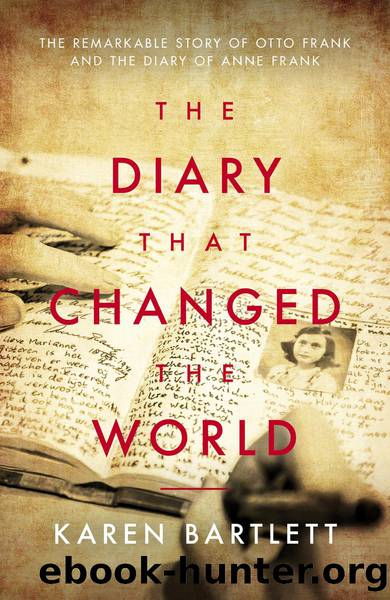The Diary That Changed the World by Karen Bartlett

Author:Karen Bartlett
Language: eng
Format: epub
Publisher: Biteback Publishing
Published: 2022-08-15T00:00:00+00:00
The Schütz translation of the diary would remain in print, as it was, for forty years, yet thereâs little evidence that her appeasements changed many hearts and minds. Opinion polls in the late 1940s and early 1950s showed that most Germans still believed Jews were a separate race, and as many as 40 per cent would support a return to Nazi rule. In December that year, Otto lamented that in Germany the book âhad sold very little, as the newspapers do not collaborateâ. Publisher Marion Schneider reported that booksellers had returned copies of the book with various excuses, while her husband later concluded in his almanac: âThe time was not yet ripe for such a document.â
Anneâs diary would not become a bestseller until six years later, when it would owe its success to worldwide fame generated in another country â America. The Germans had ignored their own story of Anne Frank and instead imported and championed an American interpretation of the Holocaust via the Hollywood-style play. After Goodrich and Hackettâs Broadway premiere of The Diary of Anne Frank on 5 October 1955, Otto and the producers immediately turned their attention to possible European productions. At the European premiere in Sweden in September 1956, Otto highlighted what he believed was the universality of Anneâs story: âThis is not a play for me, or even for Jews or Germans â it is a play for all the world.â
In Germany, the play was launched on 1 October 1956, with performances in multiple cities. This was highly unusual, as theatres normally competed for the exclusive rights to stage plays first, but it signified a recognition that issues connected to the Holocaust had a transcendent national importance. The same practice was repeated in 1965 for the screening of Peter Weissâs documentary play Die Ermittlung (The Investigation), about the first Auschwitz trial in Frankfurt.
The German version of The Diary of Anne Frank premiered in eight cities â West Berlin, Konstanz, Düsseldorf, Hamburg, Karlsruhe, Vienna, Zurich and Dresden. Goodrich and Hackett had carefully constructed the narrative of the play to end on the final note of Otto Frank on stage alone, reading through Anneâs diary to find her quote, then spoken by the disembodied voice of Anne, that she still believed in the goodness of humanity. This universal sentiment removed Anneâs story from the specific circumstances of Nazi persecution and offered Germans the opportunity for redemption and reconciliation. While there had been ambivalence or indifference to the first edition of the book, the play unleashed a wave of emotion, propelling and cementing the success of further editions of the diary. Carol Ann Lee notes that a Berlin reviewer was stunned by the play: âAfter the final curtain, the audience sat in stunned silence. There was no applause. Only the welling sound of deep sobs broke the absolute stillness. Then, still not speaking and seeming not to look at each other, the Berliners filed out of the theatre.â One West German newspaper called the play âa present-day requiemâ, enabling the audience to engage in an act of contrition.
Download
This site does not store any files on its server. We only index and link to content provided by other sites. Please contact the content providers to delete copyright contents if any and email us, we'll remove relevant links or contents immediately.
| France | Germany |
| Great Britain | Greece |
| Italy | Rome |
| Russia | Spain & Portugal |
Fanny Burney by Claire Harman(26603)
Empire of the Sikhs by Patwant Singh(23086)
Out of India by Michael Foss(16853)
Leonardo da Vinci by Walter Isaacson(13336)
Small Great Things by Jodi Picoult(7142)
The Six Wives Of Henry VIII (WOMEN IN HISTORY) by Fraser Antonia(5515)
The Wind in My Hair by Masih Alinejad(5095)
A Higher Loyalty: Truth, Lies, and Leadership by James Comey(4964)
The Crown by Robert Lacey(4817)
The Lonely City by Olivia Laing(4802)
Millionaire: The Philanderer, Gambler, and Duelist Who Invented Modern Finance by Janet Gleeson(4478)
The Iron Duke by The Iron Duke(4356)
Papillon (English) by Henri Charrière(4274)
Sticky Fingers by Joe Hagan(4198)
Joan of Arc by Mary Gordon(4110)
Alive: The Story of the Andes Survivors by Piers Paul Read(4033)
Stalin by Stephen Kotkin(3966)
Aleister Crowley: The Biography by Tobias Churton(3640)
Ants Among Elephants by Sujatha Gidla(3467)
